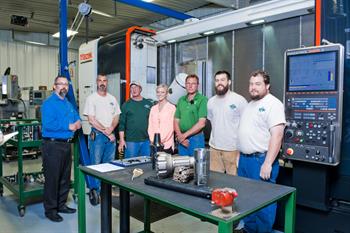
However, there is one notable difference between directional drilling to extract natural gas and drilling for the underground piping that will distribute it for consumer use. Those companies drilling natural gas wells don’t have to navigate their well holes under highways or rivers, around structures or through miles of solid rock. Utility companies, on the other hand, face these obstacles on a daily basis. And when they do, many of them rely on the horizontal percussive-hammer directional drilling technology developed and produced by Hardrock Directional Drilling Products in Winder, Ga.
Hardrock’s percussive-hammer system uses a 6” to 8” diameter bit inserted into the ground at an angle. Similar to the action of a pneumatic jackhammer, the bit delivers over 2,000 pounding blows per second that crush rock while the system also simultaneously rotates to drill in the desired direction. This capability allows construction and utility companies – such as those laying the piping for natural gas, electrical power or fiber optic cable – to drill directly through miles of hard solid rock such as granite or gneiss, as opposed to the costly alternative of going around it. The system also eliminates the need to cut paths across highways or run piping over rivers and makes it possible to drill around historical buildings and other surface structures that must remain undisturbed.
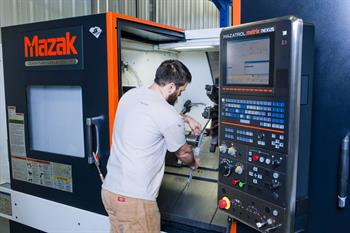
Then in 2012, Cary Cooper, Hardrock Directional Drilling Products founder and owner, decided to manufacture the company’s systems in house and gain control over production operations. However, the plan required one critical capability that Hardrock lacked, and that was advanced CNC machining.
Enter Travis Parr, current director of research and development at Hardrock Directional Drilling Products and its new Hardrock Machine Shop. At the time, Parr was working for a CAM software company, and Hardrock asked for his advice as to the type of machines he would recommend for producing its particular parts.
Parr suggested Hardrock contact Mazak at its Southeast Regional Headquarters and Technology Center located in nearby Suwanee, Ga. According to Parr, local applications support was a critical factor because “Hardrock had no machine tools, no machinists and no idea where to start in establishing a manufacturing division.”
Hardrock’s first machine was a Mazak INTEGREX e-420H-II Multi-Tasking Machining Center. The shop then added a QUICK TURN NEXUS (QTN) 450-II M CNC Turning Center with Multi-Tasking capability. The INTEGREX e-420H-II gives the shop turning, milling, boring, drilling and other operational capabilities for complete part processing in single setups. The machine stores up to 40 tools and features a 40-hp, 4,000-rpm turning spindle with full C-axis contouring, and it has a 40-hp, 12,000-rpm milling spindle with a travel of -30 to 210 degrees in 0.0001-degree increments.
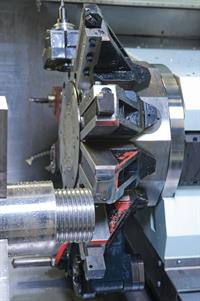
Soon after the acquisition of the two Mazaks, Parr joined the Hardrock team to bring together all the pieces of its fledgling manufacturing department puzzle. With the Mazaks, he and his team established a successful in-house production operation. And now, the Mazaks provide Hardrock with short machining cycle times, tight tolerances to ensure part quality, high levels of repeatability and advanced part processing versatility. But most importantly, the shop can produce parts using fewer machine tools and do so at a much lower cost per part than could its former suppliers.
About 32 individual parts make up a complete hammer system, and all the shop’s part materials, such as 4150, ETD 50 and 4140, are hardened to at least 35 to 40 Rc. The shop’s total amount of machined parts is split evenly between its two Mazaks, and cycle times can vary from 15 minutes to a few hours.
Machining operations involved with producing parts for hammer systems encompass front and back work milling, turning, boring and drilling. The shop produces the various hammer system components in batches of 20 or so, and the machining department, with only two people, produces about 10 complete percussive hammer systems per month.
“Our parts present some real challenges when it comes to machining,” commented Parr. “For one, the materials we use are really hard and often have scaling as result of the casting process. These two factors alone can really tax our machines and tooling. Then, on top of the material toughness, we face part features – such as 3”-diameter holes 30” deep, threaded 2-degree-angled 9”-O.D. part ends and multiple angled holes in dome-shaped part surfaces – that further push our machining limits. But the Mazaks handle it all with no problems.”
A drilling system casing part is the shaft-type, hardened-steel one that requires a big 3”-diameter – and sometimes a 3.5”-diameter – I.D. hole drilled its entire 30” length. The QTN 450-II M rough drills this hole in only 45 minutes thanks to its rigidity, power and high-torque capability. Using other less powerful machines, Parr estimated that the holes would take upwards of nine hours.
“The QTN 450-II M was acquired specifically for parts such as the casing component,” said Parr. “The machine is absolutely one of the strongest I’ve ever seen. On it, we typically run 300 to 400 sfm, feed at anywhere from 0.015 to 0.020 ipr and go 0.250” deep whenever possible. You have to be really aggressive with the types of hard materials we run. If you hesitate, bad things will happen.”
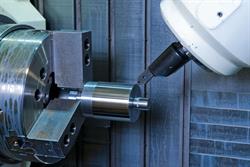
Another challenging part for which Hardrock relies on its QTN 450-II M is known as a bent sub. This component basically provides the direction capability for the percussive-hammer directional drilling process. Bent subs – made from pre-hardened 4150 steel – are about 12” long, anywhere from 3” to 9” in O.D. and have 1.250”-diameter I.D. holes running their entire lengths. These are also the parts that are angled/bent slightly at 2 degrees from their centerlines out to each of their ends that also require O.D. threading.
According to Parr, both Mazaks efficiently machine bent subs equally as fast, but the shop opted to do them on the QTN 450-II M using special custom workholding. This workholding positions parts in such a way so as to keep their angled ends on centerline for turning and the O.D. threading operations.
While Hardrock relies on the QTN 450-II M for shear machining power, it gains increased part processing versatility from the INTEGREX e-420H-II. In addition to finish boring the casing part, the machine processes many other components, including system drilling bits and an air-distributor part.
Percussive-hammer drill bits, featuring angled holes drilled in a dome-shaped surface, are made from HyTuff, an aircraft landing gear material. The drill bits are forged, so Hardrock has to first machine through a very tough layer of surface scaling before even cutting the actual part features.
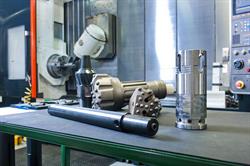
The bits require several angled holes in their dome-shaped drilling surfaces. These holes will house steel buttons that are press fit and help the bit break up rock. The hole tolerances are 0.0002”, and any variation beyond that increases the risk of the bit cracking in use. Hardrock easily drills these challenging holes and machines the other entire bit features on its INTEGREX e-420H-II. The machine can produce any one of Hardrock’s various drill bit types complete in only three hours.
Another difficult part done on the INTEGREX e-420H-II is the air distributor that directs air into the hammer portion of Hardrock’s drilling system. The part, made from ETD 150, requires about 10 to 12 angled holes. The holes are only 0.375” in diameter and 0.500” deep and, similar to the drill bits, drilled into a radius. So, the shop will first hard mill a flat into the 60 Rc hardened material at each hole location to prevent the drills from walking.
For all the shop’s parts, Parr mentioned that the tolerance capabilities and repeatability of both the Mazaks allow them to produce parts exactly the same every time. And maintaining tighter tolerances on parts also contributes to longer working life, and when they do eventually wear, replacement parts fit perfectly and perform at the same high levels as those they are replacing did.
“Our parts must be perfect, but we also need to reduce cycle times to lower cost per part,” said Parr. “And, we have successfully achieved both goals for over 32 different parts and done so using only two machines. Without the Mazaks, we would have to process parts using several separate machines, which would involve having parts traverse from one machine to the next and result in significant amounts of work in progress as parts would have to wait at each machine. For instance, without the one INTEGREX e-420 to machine our drill bits, we would need a gear hobber, 5-axis milling machine and a turning machine to process those parts.”
If one of Hardrock’s percussive-hammer drill systems fails in the field, crews will have to extract it, and if that proves impossible, they must abandon the hole and drill a new one in a different location. Such re-drilling costs valuable time and money, not to mention the loss of a drilling system being left underground.
“Our systems must not fail, and their perfect performance depends on us producing strong, high quality and precision components,” explained Parr. “And that takes machine tools, such as the Mazaks, with those same characteristics. We did consider other machine tool brands, but what also really steered us to Mazak was its high level of expert application support for the machines. We now have a great relationship with Mazak and, in particular, the Suwanee Technology Center.”
